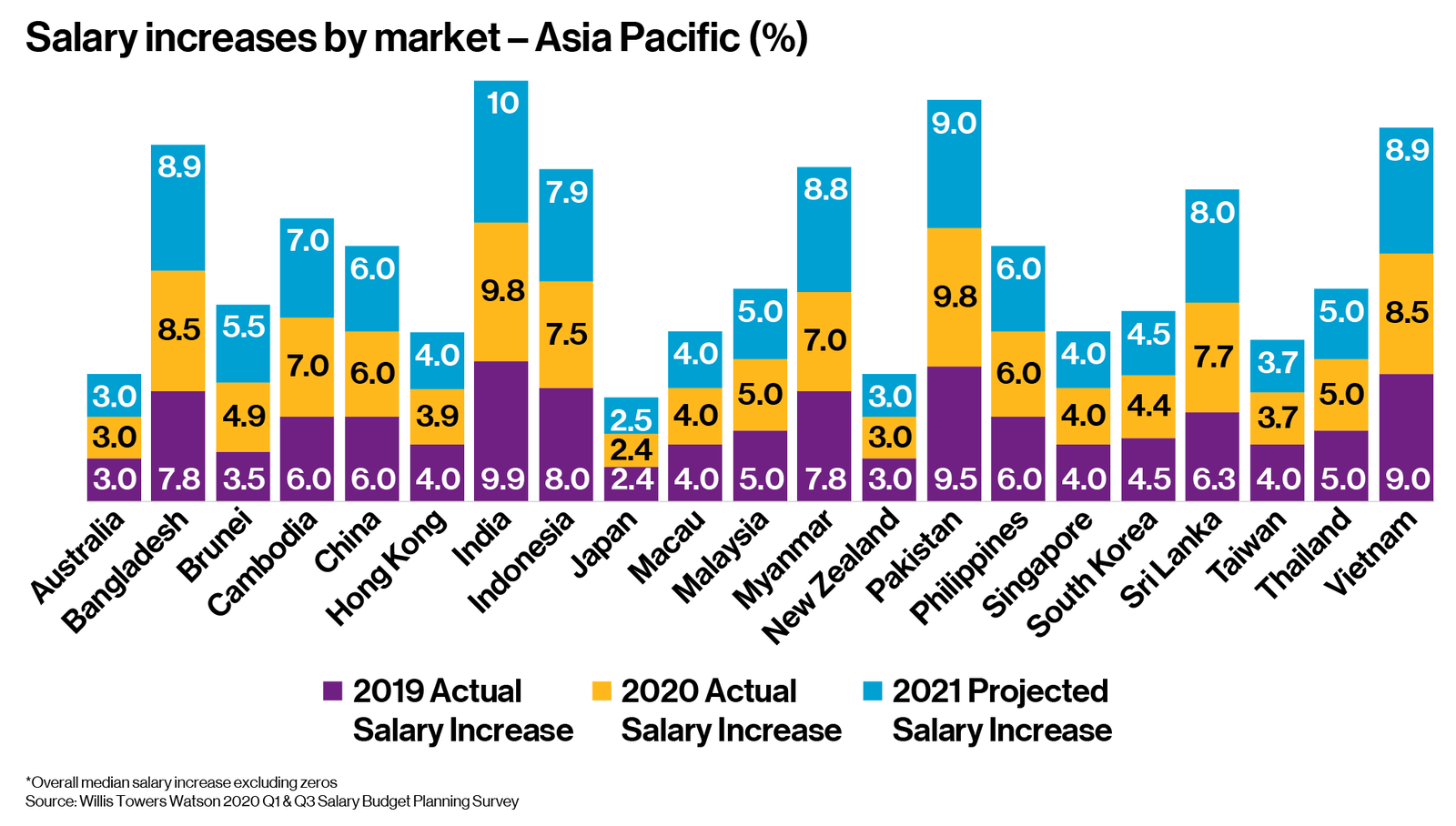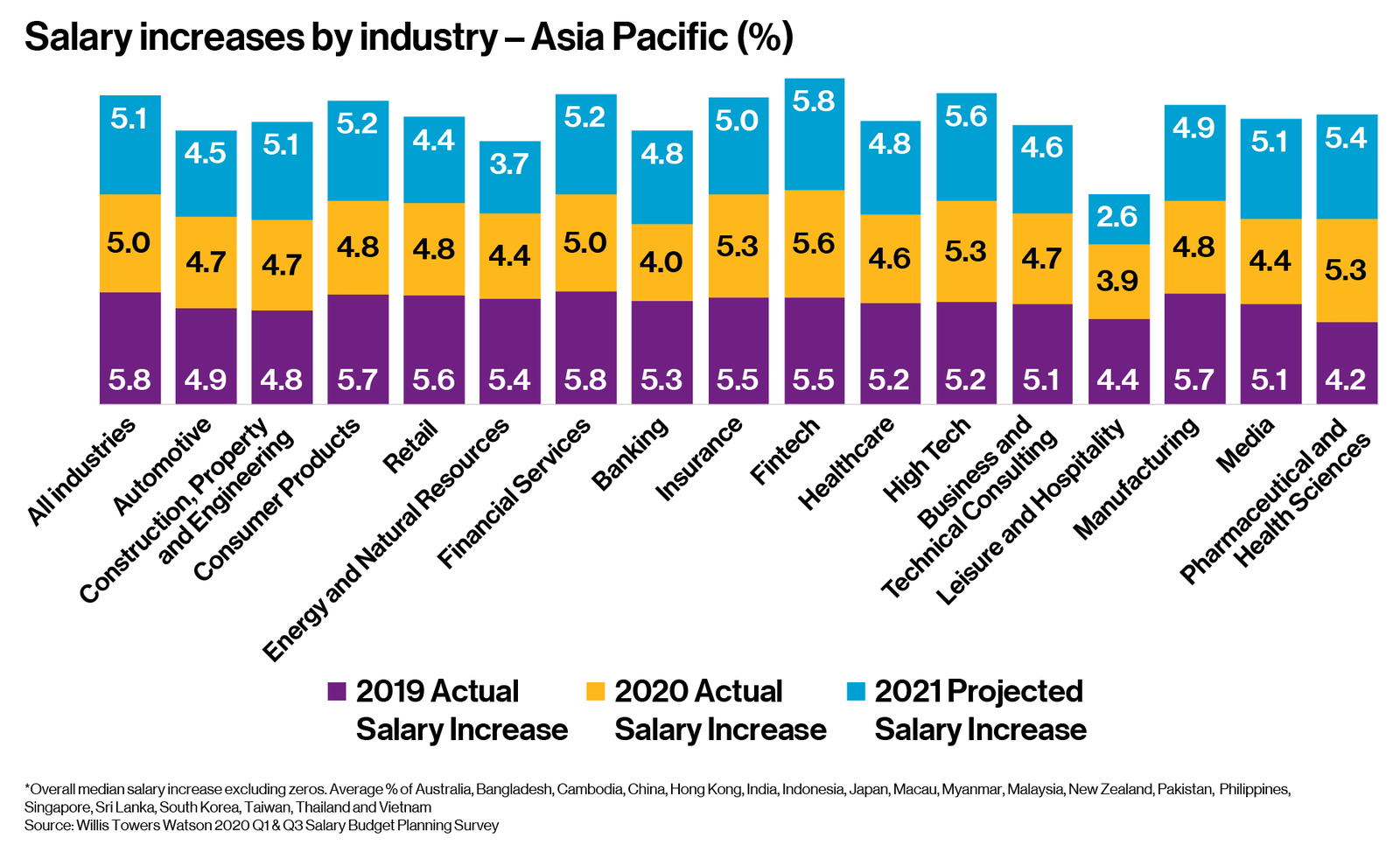share on
It's not surprising that pay rise budgets have been reduced in 2020, as a result of the COVID-19 crisis.
According to Willis Towers Watson's latest Salary Budget Planning Report, 34% of employers surveyed have made changes to their employees’ salaries in response to the COVID-19 crisis.
At the same time, of the 3,800 employers across 22 markets in Asia Pacific surveyed, 29% are planning or considering actions to manage labour costs or incentivise those who are required to work.
Among companies that have reviewed salaries, the proportion of those planning a salary freeze this year is six times higher than before the pandemic (23.5% in 2020 vs 5.1% in 2019), while the proportion of companies postponing a salary increase is almost five times higher (13.4% in 2020 vs 2.4% in 2019).
Compared to last year, 62% of companies plan to continue with their regular review of salary increases for their employees this year (vs 91.4% in 2019).
Edward Hsu, Business Leader, Rewards Data & Software, Asia Pacific, Willis Towers Watson, said: "It is no surprise to see that many companies have reduced their salary budgets. Most businesses around the world are in cash preservation and cost optimisation mode. Here in Asia Pacific, 49% of companies have already taken hiring or restructuring actions.
"Although companies are now stabilising their businesses, the full extent of the economic impact of the pandemic is yet to play out. Companies are extremely cautious and have rapidly adopted various strategies to protect their business as the sustained recovery will be gradual and slow in most markets."
Salary budgets expected to bounce back to pre-COVID-19 levels in 2021
Pay rise projections for 2021 are more optimistic as employers in Asia Pacific anticipate that salary budgets will bounce back closer to pre-COVID-19 levels, at an average of 5.8% next year.
Emerging markets such as Bangladesh (8.9%), India (10%), Indonesia (7.9%), Myanmar (8.8%), Sri Lanka (8.0%), and Vietnam (8.9%) are projecting a stronger rebound of salary increases, indicating a strong confidence in the recovery of their economies.
In Singapore, Malaysia, Thailand, and the Philippines, the projected salary increases for 2021 remained the same as the actual salary increases for 2020 and 2019. Singapore projected a 4.0% salary increase, Malaysia and Thailand both projected a 5.0% salary increase, while Philippines projected an increase of 6.0%.
Hsu added: "The pandemic is also forcing employers to rethink virtually every aspect of how work is being done, the type of talent they need and how to reward this work as they transform their businesses. Companies should review their business priorities and talent requirements to prepare for next year, especially if they need to re-allocate resources and salary budgets to the changing business environment and objectives."

Fintech industry leads the way with the highest salary increase in 2020, while leisure and hospitality rounds up the rear
By industry, the survey found that companies in the fintech sector are planning to increase their salary budgets next year due to the brighter business outlook in these industries.
In recent years, the fintech industry has been leading the transformation of traditional financial services companies. From enabling financial transactions to be carried out remotely to facilitating contactless payment and the distribution of government aid during the pandemic, fintech companies have been crucial in supporting the battle to curb COVID-19 infections in many countries.
This has kept the sector’s salary increases ahead in most markets, with an actual salary increase of 5.6% in 2020 and a projected increase of 5.6% for 2021.
On the other hand, the report shows a decreasing salary budget in the energy and natural resources, as well as the leisure and hospitality industries.
The outbreak of the coronavirus, coupled with the oil price crash and the economic recession present an enormous challenge for the energy and natural resources sector, which led to a lower projected salary budget for next year (3.7% in 2021 vs 4.4% in 2020).
Similarly, with the leisure and hospitality sector being the hardest hit by the COVID-19 lockdowns globally, and with an extended recovery period expected, the sector projected a lower salary budget for next year (2.6% in 2021 vs 3.9% in 2020)

Infographics / Willis Towers Watson
Photo / 123RF.com
share on
Follow us on Telegram and on Instagram @humanresourcesonline for all the latest HR and manpower news from around the region!
Related topics


